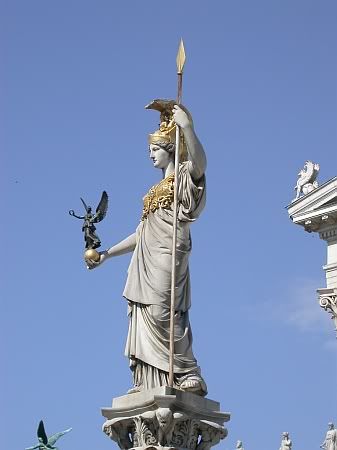The golden apple
The nice thing about Greek Mythology is that they seem to be rather simple stories, but they carry a rather complex message.
I'd like to use the story of the golden apple as an example.
You all probably know the story.
Zeus is throwing a party in honor of the marriage of Peleus and Thesis. Eris an alleged party-pooper is not invited. So she comes up with a plan to disrupt the party.
She picks a golden apple en writes the following text ont it: καλλίστῃ or, "for the fairest one". Then she secretly sneek into the party and rolls the apple on the floor into the crow.
The three main godesses Hera, Athena and Aphrodite start fighting for it. The other gods stand timidly aside and watch the brawl. As the scratching and biting starts to get ugly, Mars decides to get Zeus. Zeus in the mean time was standing at the bar drinking his wine and bragging to Apollo about his latest adventure, impressing some muzes.
A smuck Mars tells him that his 'wifes' are fighting and isn't he supposed to do something about it. Zeus crosses over to the fight and bellows at the top of his voice: "LADIES".
De fighting stops. The women get untangled. And then, while brushing off a dustspeck of her sleeve she say: "Zeus,who do you think is the fairest".
Zeus, suddenly getting this being fried sensation and feeling the golden apple in his mouth, has to think fast. "I am not an expert on fairness" he claims and he sends the three women to Paris, an seventeen year-old prince of Troy, who gives the golden apple to Aphrodite."
Question is: Could Zeus know that Paris was going to give the apple to Aphrodite?
The nice thing about Greek Mythology is that they seem to be rather simple stories, but they carry a rather complex message.
I'd like to use the story of the golden apple as an example.
You all probably know the story.
Zeus is throwing a party in honor of the marriage of Peleus and Thesis. Eris an alleged party-pooper is not invited. So she comes up with a plan to disrupt the party.
She picks a golden apple en writes the following text ont it: καλλίστῃ or, "for the fairest one". Then she secretly sneek into the party and rolls the apple on the floor into the crow.
The three main godesses Hera, Athena and Aphrodite start fighting for it. The other gods stand timidly aside and watch the brawl. As the scratching and biting starts to get ugly, Mars decides to get Zeus. Zeus in the mean time was standing at the bar drinking his wine and bragging to Apollo about his latest adventure, impressing some muzes.
A smuck Mars tells him that his 'wifes' are fighting and isn't he supposed to do something about it. Zeus crosses over to the fight and bellows at the top of his voice: "LADIES".
De fighting stops. The women get untangled. And then, while brushing off a dustspeck of her sleeve she say: "Zeus,who do you think is the fairest".
Zeus, suddenly getting this being fried sensation and feeling the golden apple in his mouth, has to think fast. "I am not an expert on fairness" he claims and he sends the three women to Paris, an seventeen year-old prince of Troy, who gives the golden apple to Aphrodite."
Question is: Could Zeus know that Paris was going to give the apple to Aphrodite?








